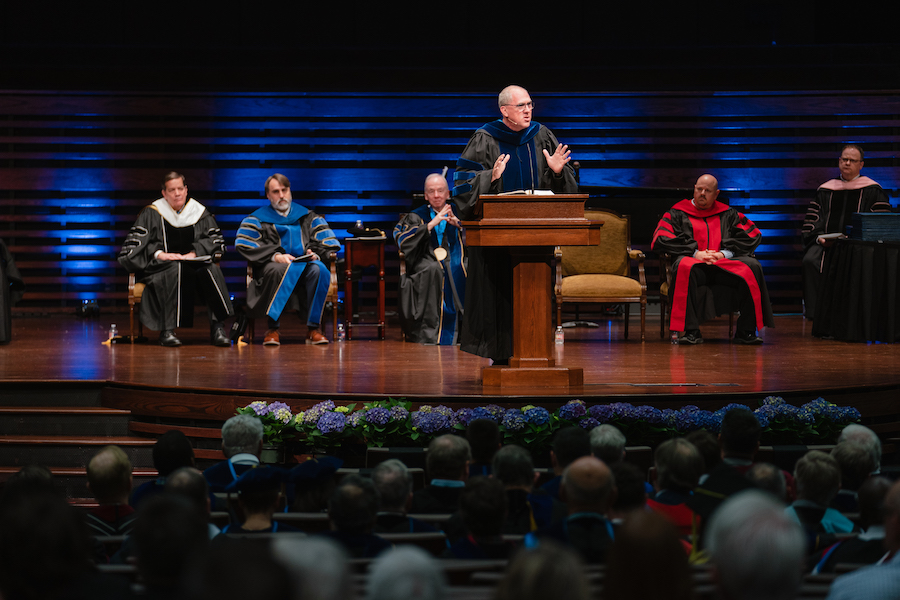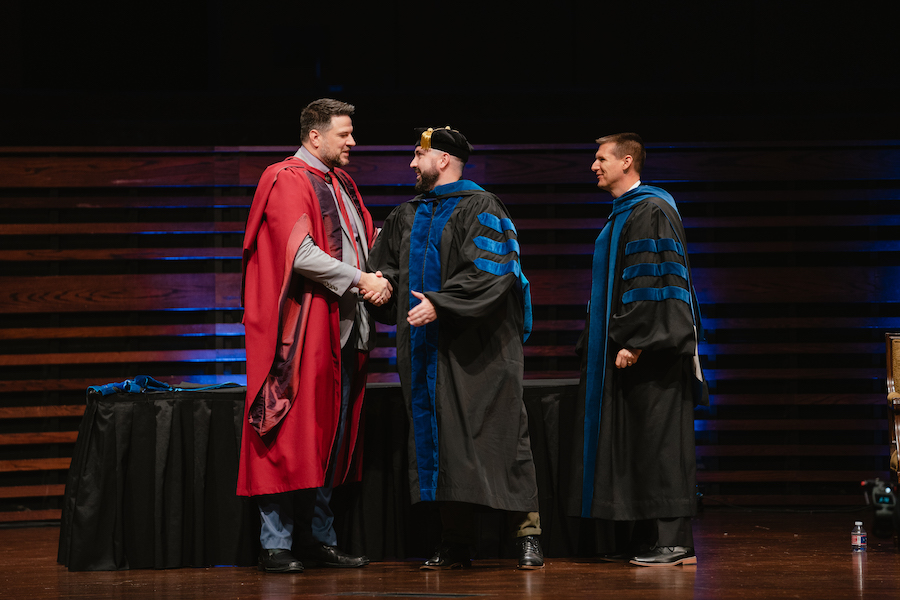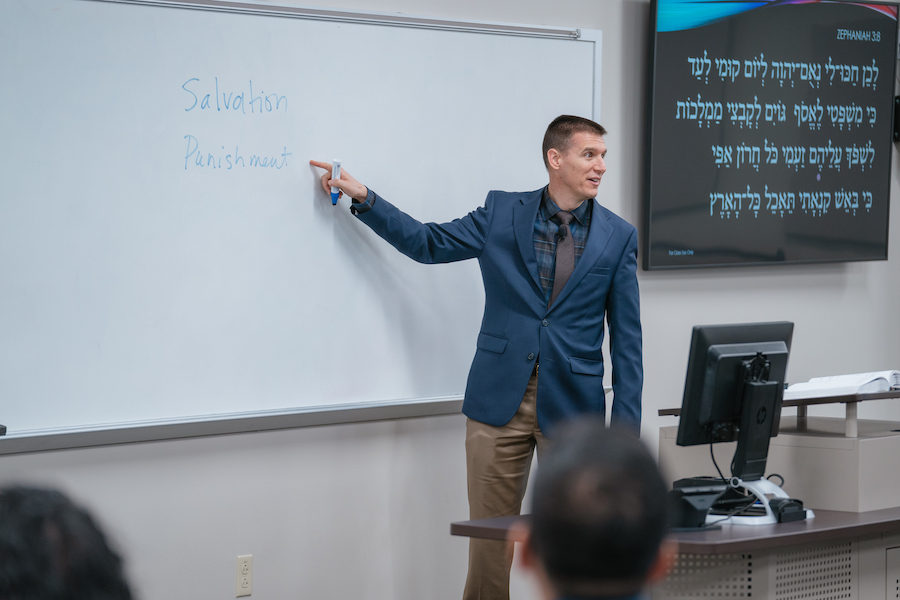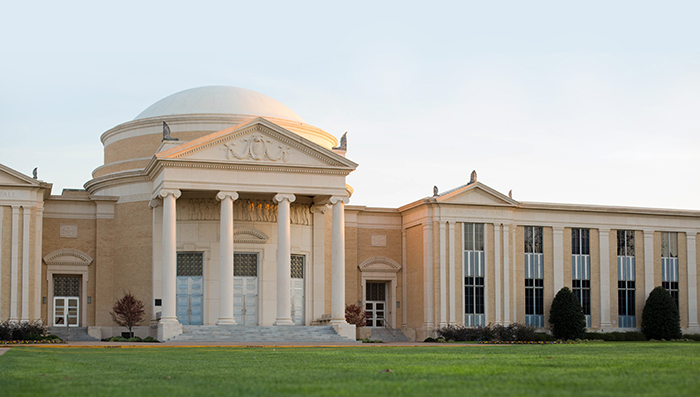FEATURE: Refuge in Christ, refuge in Wales
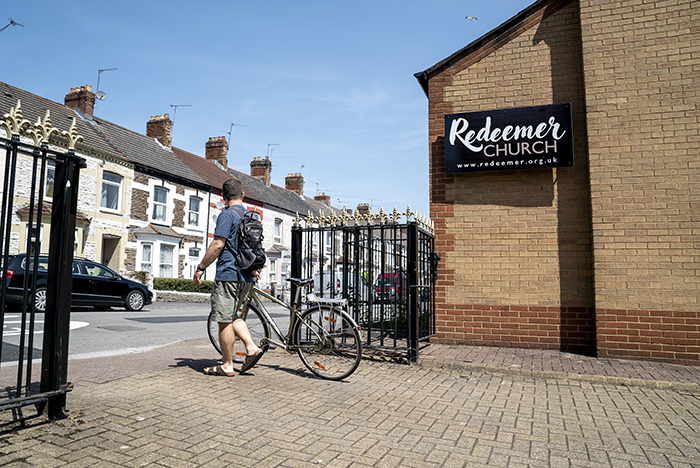
Editor’s Note: The following feature story originally appeared in the fall 2019 issue of Southwestern News (pg. 46-50).
At Sea – A Seed is Planted
As their less-than seaworthy vessel approached the coast of Greece, Maeen and Ghalia,* mother and daughter, joined a chorus of fellow seafarers and cried out for help.
Crashing waves threatened to end the arduous journey that began days earlier under the cloak of darkness in a war-stricken country to the southeast. The timber and volume of their voices waned as waves continued to lap relentlessly over the sides of the boat.
One timid woman who had said little on their journey across the sea, finally in a moment of desperation, cried out to “Issa” for salvation. Moments later, the coast guard rescued them and their fellow companions before the vessel capsized.
A City of Refuge
For missionary Ross Frierson and his family, hearing stories like Maeen and Ghalia’s has become an everyday part of life in Wales. One of four countries included in the constituent countries of the United Kingdom, Wales occupies more the 1,600 miles of rugged coastline along the western edge of Great Britain.
Two years before the Friersons arrived in Cardiff, the capital city of Wales, census data recognized this city as the location in the United Kingdom with the highest inflow rate of international migration.
The world is literally arriving at the port of Cardiff.
On Land – A Seed is Watered
Over the course of many months, with false starts, setbacks, and difficulties characteristic of those living daily in the reality of the global refugee crisis, Maeen and Ghalia made their way across western Europe, landing at last in Wales. The hardship and length of their journey across the continent, a considerable portion of which was made on foot, took a serious toll on Maeen’s body. By the time they reached the country of Wales, she required the assistance of a walker to remain ambulatory.
Undeterred by the physical limitations of her body, Maeen desired to find a place for connection and to learn more about “Issa,” the one to whom she heard that fellow passenger on the sea cry out before their rescue. These two women who had escaped from the Middle East found refuge in Christ amongst a community of believers at Redeemer Church in the Splott neighborhood of Cardiff, Wales.
Redeemer Church
“Splott looks a lot like it sounds,” says Frierson.
The unassuming neighborhood is reminiscent of one of the boroughs of New York City—compact brick homes and multi-family housing units in tight proximity to one another on streets forming near-perfect grids. Pavement walls stand thick and old, often embellished with murals or graffiti. Neighborhood shops sell fresh baked goods and know the names and orders of each neighbor who walks through the door. Outsiders are given a wary glance.
Redeemer Church sits on Railway Street in Splott, but initially began as a group gathered in the home of Dai and Michelle Hankey.
The Hankeys, a Welsh family who moved to Cardiff in the fall of 2016 with the specific goal of planting a church, felt the Lord’s call to the adjoining neighborhoods of Splott and Adamsdown. This area is primarily known for being home to residents who are marginalized, asylum-seekers, refugees, or those who have endured human trafficking.
The core members of what is now Redeemer Church, united in their love for Christ and all people, have a heart for serving those who have come from hard places, because many of them have come out of similar, if not the same, circumstances.
When Ross and his wife, Dena, took a vision trip to Wales to pray about and consider moving there to plant churches with the International Mission Board (IMB), they met Dai Hankey and his family. A strong connection formed because of a shared emphasis on church planting and reaching those whom many overlooked or looked down upon.
Their first Sunday in Cardiff, the Friersons went to the 3 p.m. service of Redeemer Church. They never left.
“They’ve adopted us into the family and allowed us to participate in and lead in the life of that church,” says Frierson. “I’ve come out of Southwestern Seminary with a love for the local church, and a desire to serve the local church and to plant churches where they are not really being planted.”
Frierson, a two-time graduate of The Southwestern Baptist Theological Seminary, credits his time in seminary with kickstarting in him a love for the bride of Christ, the local church. After completing his Master of Divinity in 2011, he and his wife served in rural Russia with another couple whom they met in Fort Worth and jumped into the task of planting a church on the edge of Siberia.
In 2014, Ross was accepted into the doctoral program at Southwestern Seminary in the field of World Christian Studies. Despite starting the degree in Russia and completing it after his move to Wales, Frierson found that the Lord providentially placed him in this program to prepare him for the context in which he would eventually serve.
“The World Christian Studies Ph.D. lies at the intersection of missions, history, and, to some extent, social sciences with migration patterns,” says Associate Dean of the Roy J. Fish School of Evangelism and Missions Matt Queen, one of Frierson’s professors.
Students track the spread of Christianity, and the program “brings people living in non-Western contexts and post-Christian contexts together—missionaries working in those contexts along with indigenous peoples working in those contexts—and they’re all sitting at the table together,” Queen says.
As students work through their program of study, they look at four specific areas in the spread of Christianity globally: Gospel transmission, Gospel translation (or reverse contextualization), Gospel transformation, and Gospel re-transmission.
“This is the real shibboleth for us,” Queen says of this fourth area. “It’s the real proof that somebody has not just taken Christianity and syncretized it, but if Christ has really come to a person or to a society, they are then going to re-transmit the Gospel.
“We believe that if anybody ever hears the Gospel and receives it, they can’t help but then transmit it to others in their society and others in other societies. The question then becomes how does the Gospelchange the culture—not so that the culture becomes Western, but so that the culture becomes Christian.”
Frierson, who completed his Ph.D. in 2018, sees a unique shift that has taken place in Gospel re-transmission in Cardiff. “Think about the Christian heritage of Wales—revivals a century ago,” he says. “Now the condition of the church, to put it mildly, is not healthy; the church is shrinking.”
“You have that in recent history,” he continues, “this explosion of the church and then a rapid decline in the last few decades. Now you have a lot of church growth that is being fueled by immigrant populations, who have come as a part of the global refugee crisis. You see an explosion in church attendance, but not from British people, but Iranian refugees or asylum-seekers or different African populations that have come here as refugees.”
On a recent Sunday at Redeemer Church, of the nearly 50 gathered worshipers, 18 unique nationalities were represented.
“[It has] been so good to be a part of seeing a local church grow in this community and how the local church functioning as a family has really adorned the Gospel in a way that is compelling,” says Frierson. “People are attracted to what they see in this Redeemer Church family.”
In Splott – A Rebirth
After spending time with members of Redeemer Church and seeing their love for one another and their love for Christ, Maeen and Ghalia approached pastors Dai and Ross about accepting Christ. The pastors brought an Arabic-speaking translator along with them for a meeting at the mother and daughter’s home. They spent nearly four hours walking through the Gospel and its implications with the two women.
The pastors urged the women to count the cost, to consider the potential ramifications of following Jesus amongst their family at home and their community. But the women were certain that they both wanted to place their trust in Christ, in Issa—the One who had saved them on that stormy sea off of the coast of Greece.
Working Together
“The consistent witness of the local church led to this day,” reflects Frierson on the day in the summer of 2019 when Maeen and Ghalia accepted Christ.
“The best way to ensure an ongoing Gospel witness in this community is to invest deeply into building a healthy local church so that, 50 years from now, there will be a continued Gospel witness,” he says.
“I want every single person in this community to have heard the Gospel and have had an opportunity to respond to a clear Gospel presentation and to know somebody who is a part of the church and to be able to see firsthand how the local church adorns the Gospel. That’s looking at the long-term goal—not rapid multiplication, but healthy multiplication.”
The vision for Redeemer Church and the IMB team in Cardiff is to see a stream of church plants going out to at least four generations and, prayerfully, beyond. Their every aim is to be a part of multiplying and equipping successive generations of churches that will be a light in the darkness. And for Ross Frierson, that means being deeply invested in a community and proclaiming the Gospel boldly.
“I’ve found that just engaging people in a spiritual conversation, talking about the Gospel, people [here] are open to having that conversation,” he says. “I can’t think of one negative experience where someone just flat shut me down. It doesn’t really happen.”
“If believers here are bold enough to engage someone with the Gospel, it’s not going to end poorly,” Frierson continues. “… I think people are willing to hear, especially when they know that there’s a local church that cares about the community, is engaging with the families in the community. They are really open to spiritual conversations.”
At Sea – The Gospel Takes Root
On a blustery July day, Redeemer Church held a baptism service in the frigid waters of the Bristol Channel for several members who had recently accepted Christ as Lord and Savior. Among those ready and eager to be baptized were Maeen and Ghalia.
After they baptized a young man, Frierson and Hankey turned to one another for a brief discussion, deliberating how they would get Maeen into the surf to baptize her.
Her broken body would make it nearly impossible for her to wade out into the rough sea, so they discussed possible options. Should they go ashore and carry her out deep enough? Should they consider alternate baptism methods?
After they came up with a quick game plan and turned to make their way to the shore, the pastors saw a figure in the breaking waves. Maeen, on her hands and knees, was pulling herself out to sea, one arm in front of the other; pummeled by the waves and unable to stand, but driven to do whatever it took to identify with Christ in baptism.
“It was a moving picture for me; to think about a visual representation to follow after Christ having counted the cost” Frierson recalls. “I will carry that one with me until the day I die.”
*Names changed for security purposes.
